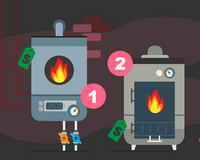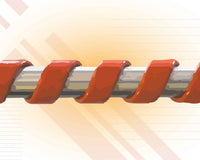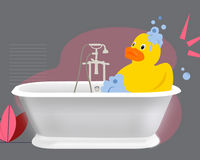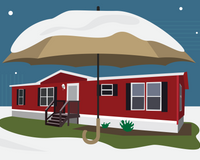This article was originally published on the Frugal Fortress by Steve Gillman.
Introduction
My wife and I have owned eight homes, but none were as financially beneficial as the mobile home I bought years before we were married. I paid $19,500 and sold it a dozen years later for $45,000. I also collected more than $50,000 renting out rooms in my mobile while I lived in it.
There’s a lot of negativity about mobile homes. For example, financial guru Dave Ramsey says “From a financial standpoint, mathematically, you’re buying a car that you sleep in…” He says it’s not so bad if you get the ones disguised as houses, but he adds, “If it looks like a trailer, smells like a trailer, it’s going to go down in value.”
That smells like bias to me, and one that for obvious reasons I don’t share. Yes, there are often good reasons to buy a site-built house, but mobile homes have some advantages too. So it’s time to dispel some biased beliefs and look at whether you might want to buy a mobile home.
1. It’s Usually Better Than Renting
I bought a mobile as my first home because I couldn’t afford a “regular” house, and it made more sense than renting. My mortgage payment was $257 per month. Add that to my property taxes, insurance, and maintenance, and I was spending less than what it would have cost to rent a decent apartment.
I bought a mobile on a small lot, which is partly why I did so well with it. But what about buying one in a park on a rented lot? Can that make sense?
Ramsey makes his opinion clear: “Before, when you were paying out X number of dollars in rent, that’s all you were losing. Now you’re paying out X number of dollars in rent and you’re losing money every day on the ownership of the thing, so you’ve done double dumb now.”
Now, he might have a point if your alternative is to buy an affordable house instead. But if the alternative is renting, you have to crunch the numbers. Let’s start with a simple example.
Suppose a decent apartment rents for $900 where you live, but you can buy a mobile home with a payment of $450 per month and lot rent of $350 per month. Add $100 for maintenance and you have just about the same amount going out each month.
Ah, but your mobile is dropping in value. So let’s suppose you paid $30,000 for it and sold it for $20,000 years later after paying off the loan. You then have $20,000 more than if you had rented for all those years. Is that “double dumb?”
The catch is that you might move before you pay off your loan. That can get tricky, especially if you owe $25,000 on a mobile worth $20,000. The solution? Buy an inexpensive used mobile home. The depreciation has mostly happened, so there is little to lose.
For example, an older mobile bought for $6,000 isn’t likely to lose value much because people have to live somewhere. But even if it drops in value a little, with the lower price you get a lower payment, so you might be saving more than $200 per month versus rent. That easily covers depreciation.
It’s even better if you happen to have cash. Pay cash and you might save as much as $500 per month versus renting an apartment. You could literally throw away the home two years later and be far better off, since you would have saved $12,000 (versus renting) in that time.
2. Mobiles on Land Appreciate Like Other Homes
Real estate does not always go up in value, as many people discovered a decade ago. But when houses are rising in value mobile homes with their own lots go up with them. There is plenty of evidence that mobile homes do appreciate in value.
Clearly that was my experience, but it’s also common sense. After all, if land values rise the value of a given lot is likely to rise, even if a “car you sleep in” is parked on it.
You should consider buying an older mobile home, because most depreciation on the structure itself will have passed. I figure that at the time I sold my home for $45,000 the mobile itself, if it was taken away, was worth less than $5,000. The total value was in the fact that it was a livable place on a piece of property. It still is.
3. Appreciation Isn’t the End of the Story
Another biased belief is that you’ll always gain more equity when you buy a big expensive home. The reasoning goes something like this: 20% appreciation on a $200,000 house is $40,000 while a 20% gain on a $50,000 mobile is just $10,000, so buy as much home as you can afford That sounds reasonable, but it ignores an important factor:
Your ongoing costs are higher with a more expensive home, and that can offset any equity gain from appreciation.
A bigger home costs more to heat, cool, and maintain. A bigger mortgage means higher interest charges. A higher price also means higher property taxes and insurance rates. You could easily spend $750 moreper month to buy the biggest home you can afford, versus something smaller and less expensive.
That $750 per month is $9,000 per year extra versus living in a cheaper mobile home. What if you saved and invested $9,000 per year? Ten years down the road you might be much further ahead than if you had bought an expensive house.
And yes, in my case I did save and bank a lot more money because my housing expenses were so low. This was especially true after I quickly paid off the mortgage loan.
Also, the whole “buy as much as you can afford” argument assumes real estate values will go up. What if they don’t? What if they drop? In that case…
4. A Mobile Home is Housing Crash Insurance
Proportionality of gains is true of losses as well. A 20% drop in value is $40,000 on a $200,000 home, but only $10,000 on a $50,000 mobile. And actually, because people always have to live somewhere, lower-priced homes generally fall less in value, even on a percentage basis. So if you suspect home prices are topping out, it may make sense to buy a mobile home just to keep your investment in real estate to a minimum.
For example, in 2005, when my wife and I lived in Tucson, Arizona, we looked at houses and it was clear we were in a real estate bubble. A small two-bedroom house cost at least $150,000. As friends jumped in and bought even more expensive houses, we bought an old mobile home on a rented lot for $9,000 cash.
Lot rent was $300, saving us about $200 per month versus our previous apartment. In 2006 we sold the mobile for $9,000 (exactly what we paid) and moved to Colorado, where we bought a small house for $65,000. Had we bought that $150,000 home in Tucson we would have lost at least $40,000 as prices plunged in the coming years.
Meanwhile, even though we bought at the top of the market in Colorado, we sold that $65,000 home for $72,500 a few years later (and then lost big on the $143,000 home that replaced it). I’m convinced by this (and by common sense) that low-priced homes can’t lose nearly as much value as higher-priced ones because people have to live somewhere. And mobile homes are some of the lowest-priced options.
5. Mobile Homes Can Be Financed
People have this mistaken idea that you can’t get financing for a mobile home. Through HUD programs banks will loan up to $69,678 on a mobile home on a rented lot, and up to $92,904 on mobile home attached to a lot. And according to the Consumer Financial Protection Bureau “More than 2,000 institutions reported originating one or more manufactured housing purchase loans in 2012” (more recent statistics are not available).
There are several other ways to borrow for a mobile home purchase. I borrowed the money for my first home from a local bank that held it’s own loans. I did it while I was unemployed (I said I was going back to work soon, which was true). Banks that hold their loans are more flexible.
You can also look for seller financing. I sold a mobile home (one I owned as a rental) for $22,000 with just $1,000 down. Because older mobiles are more difficult to finance traditionally, sellers are often willing to take payments in order to make the sale.
You can also borrow from family. Just be sure to put it in writing and record a mortgage.
6. Mobile Homes Can Be in Nice Neighborhoods
Yes, there are some ugly and rough neighborhoods with mobile homes, but the same is true for some areas with “regular” homes, so ignore the stereotypes. Just check out the neighborhood before buying.
I never locked the door on my first mobile home. There was a river at the end of thes street with hiking trails along it. The neighborhood was generally quiet.
7. Mobile Homes Can Be Safe
If you’re in an area with a lot of tornados a mobile home will probably never be as safe as a brick house. Plan accordingly; Although tornadoes were rare where I lived, I has a cement-block well pit I could climb into and close, just in case.
You’re safer buying mobiles made after 1976. That’s when new HUD standards went into effect. In fact, post-1976 mobile homes have lower rates of fires than site-built homes.
8. Mobile Homes Are Great First Homes
We may own a mobile home again at some point. My wife is not opposed to the idea because she would rather we spent our money having fun than supporting a big house. In any case, a mobile can make a great first home for the following reasons…
- Lower price
- Smaller mortgage loan
- Lower monthly costs
- Less maintenance
- Less financial risk
- Better than renting
Here’s another advantage: When you move to a house someday you can keep your mobile home and have rental income. That’s what my wife and I did when we traveled the country looking for a place to buy our first house together.






